- Learning time
- 40 minutes
- First play time
- 120 minutes
Magnate: The First City
Designed by: James Naylor
In Magnate: The First City, players are industrialists developing the city in question, looking to make the most money at the end of the game. When exactly the game ends, however, is also critical to their success – or failure.
The city begins with a board at its centre already occupied by two each of the games’ four types of buildings: residential, retail, offices and industry. Around that extra boards are laid, with each board representing a neighbourhood and each neighbourhood broken into nine plots of land: each round, some plots become available to buy – players start with some cash in their wallet – and, subsequently, build on. Your goal is make money first by renting buildings, and latterly selling them, but before you can rent a building you have to build it, and to build it you need land!
Each round players take three actions, and the actions are simple: buy land, build property, consult (-take cash equal to the current land price from the bank) or take advertising, which comes in the form of small tokens showing dice on them – the point of which will become clear soon.
Buildings need tenants, so from round 2 onwards (in round one players don’t have any buildings) you try to attract tenants, which is where Magnate brings in an element of risk: each building can hold X amount of tenants, but your success in attracting them depends on two things: making sets of dice, and how many dice you get to roll, which is defined by the neighbourhood you’re building in and the ones around it. We won’t explain in detail here, but – as feels thematically apt – offices have a better chance of tenants if there are residential buildings nearby, industry buildings like being near other industry, residential buildings don’t want to be near industry, and so on. Basically, each type of building has a potentially symbiotic relationship with those around it – and here’s where your advertising tokens come in handy, as you can spend them to guarantee some success in the dice-rolling. Once everyone has brought in tenants (or attempted to) players collect rent from their buildings: hooray! You’re now landlords.
At the end of each round, the players adjust the property market, which will change according to a number of things: how many potential tenants are still available, how many advertising tokens the players spent, and whether players sold any properties. These aspects may drive the land price up, and the crash marker down: and these two markers are the explosive hub around which each round of Magnate swings as one rises and another drops: when the two markers meet, the game will end. Before that happens, you’ll have hopefully sold land at an enormous profit: calculating its value (land + building + tenants + potential bonuses for neighbouring buildings or features) and multiplying the current land price by your total for the cash reward. Selling after the crash – at game end – will get you a comparative pittance, as the land price will have plummeted to near-zero. There is a lot of tactical play in Magnate – which is why there is a bid for turn order – but gauging the best moment to sell is really the dark heart of the game.
The guru's verdict
-
Take That!
Take That!
Round by round, there's no overriding sense of combat or theft. But turn order can be important in the buying, and absolutely paramount in the selling, where going first can be dangerous if the game is perched on the edge of the market cliff...
-
Fidget Factor!
Fidget Factor!
Fairly high on a first play, especially as everyone gets their heads around the attracting of tenants. But dropping substantially, to the point where Magnate feels mostly-breezy: all the actions are very easily understood.
-
Brain Burn!
Brain Burn!
That said, *what* to do *when* is the challenge before you, and gauging when to sell is, by some distance, the key aspect in the game.
-
Again Again!
Again Again!
Set up, tenants and market crash all carry elements of chance, so no two plays will ever be identical.

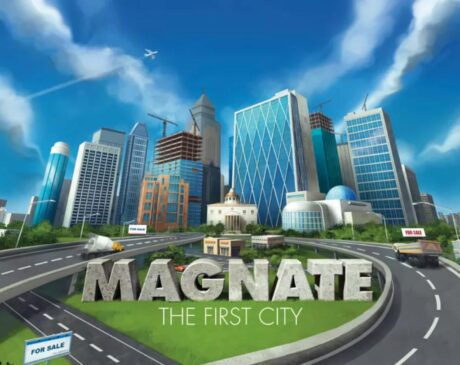

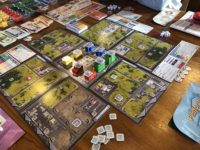
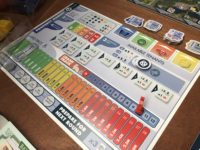
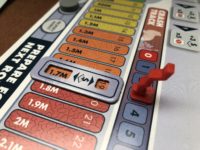

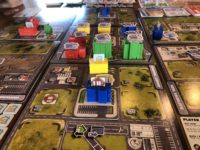
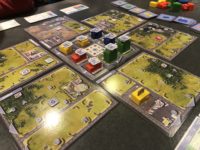




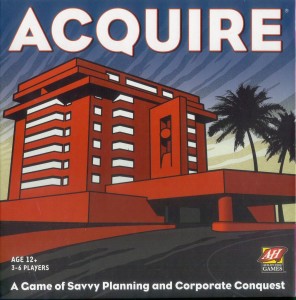


Sam says
For all that I feel Magnate feels overproduced - a huge box, full of plastic buildings - and the mechanics of attracting tenants feels slightly convoluted, I also have to doff my cap to first-time designer James Naylor for not only nailing what makes a good property game - elements of risk, various strategies but fast-moving turns - but also providing the scathing commentary that Monopoly set out to be when it was young. As these investors 'in the future' you don't really care about your tenants, or the city: you want to make cash, and will do so by not just foreseeing the crash, but actively engineering it. It's ten times the game its predecessor is, whilst playing in half the time, and I recommend it heartily!